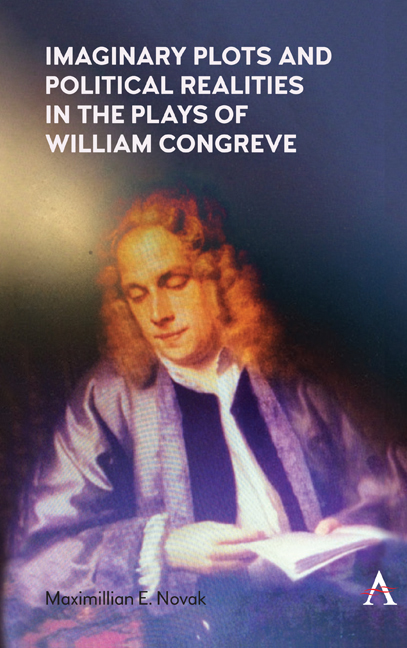Book contents
- Frontmatter
- Contents
- List of Illustrations
- Acknowledgments
- Preface
- 1 The Politics of Love, Marriage, and Scandal in Congreve's World
- 2 Incognita and Some Problems in Morality and Epistemology
- 3 The “Fashionable Cutt of the Town” and William Congreve's The Old Batchelor
- 4 Political and Moral Double Dealing in Congreve's The Double Dealer
- 5 Foresight in the Stars and Scandal in London: Reading the Hieroglyphics in Congreve's Love for Love
- 6 The Failure of Perception and Politics in Congreve's The Mourning Bride
- 7 Politics and Congreve's The Way of the World
- Afterword
- Works Cited
- Index
7 - Politics and Congreve's The Way of the World
Published online by Cambridge University Press: 21 July 2020
- Frontmatter
- Contents
- List of Illustrations
- Acknowledgments
- Preface
- 1 The Politics of Love, Marriage, and Scandal in Congreve's World
- 2 Incognita and Some Problems in Morality and Epistemology
- 3 The “Fashionable Cutt of the Town” and William Congreve's The Old Batchelor
- 4 Political and Moral Double Dealing in Congreve's The Double Dealer
- 5 Foresight in the Stars and Scandal in London: Reading the Hieroglyphics in Congreve's Love for Love
- 6 The Failure of Perception and Politics in Congreve's The Mourning Bride
- 7 Politics and Congreve's The Way of the World
- Afterword
- Works Cited
- Index
Summary
This is an Age of Politicks. (1691)
Few comedies provide such brilliant opportunities for actors to show off their talents as Congreve's The Way of the World. Yet however much Congreve directed his talents toward creating a comedy that would please the theatrical audience, he also turned to a number of serious and interrelated themes. At its heart, Congreve's play is very much a fable about the complexities and difficulties of family relationships. At the same time, it has much to do with the related subject of politics, reflecting considerable pessimism about the dismal contemporary political scene. I also want to argue in this essay that the play is essentially about the problems of Mrs. Arabella Fainall. Such a view is admittedly counterintuitive in that it is contrary to our sense of the play as performance. As readers and audience, we have to find pleasure in the lovers, Mirabell and Millamant, played originally by John Verbruggen and Anne Bracegirdle, and be fascinated by the villainous Fainall and Marwood, played by the most accomplished actors of the time, Thomas Betterton and Elizabeth Barry. In addition, the part of Lady Wishfort, acted originally by Elinor Leigh, can be powerful enough to dominate the entire play. By comparison, the role of Mrs. Fainall, acted by Elizabeth Bowman, had little of the theatrical fireworks of those acted by the stars of Betterton's Lincoln's Inn Fields troupe. And yet the “moral” of the play, spoken at the end by Mirabell, appears clearly aimed at Mrs. Fainall's situation:
From hence let those be warn’d, who mean to wed;
Lest mutual Falshood stain the Bridal- Bed:
For each Deceiver to his Cost may find,
That Marriage Frauds too oft are paid in kind.
I am not arguing that we should ignore in any way the theatrical aspects of the play. But we should pay some attention to Congreve's “Dedication to Ralph, Earl of Montague,” in which he appears to express surprise that his work succeeded so well on the stage and emphasizes the artistic elements of his comedy, comparing it to the works of the classical writers, Terence and Menander. A careful reading may allow us to focus on what Congreve considered the central concepts of his play.
- Type
- Chapter
- Information
- Publisher: Anthem PressPrint publication year: 2020



